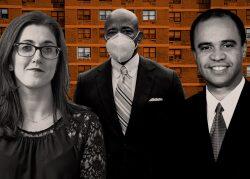The city’s first chief housing officer has announced that she is stepping down after 16 months on the job.
Jessica Katz is leaving the administration as the city grapples with an influx of asylum seekers, staffing shortages in its housing agencies and an unclear path to reaching its housing production goals.
“Jessica worked every day to ensure that New Yorkers were at the center of our housing policies, whether an individual experiencing homelessness, a family living in NYCHA, or a lifelong New Yorker struggling to stay in the neighborhood they love,” Mayor Eric Adams said in a statement. “Our administration and the entire city are grateful for her service.”
Gothamist was first to report her decision to leave.
“These jobs are a real sprint,” Katz told the outlet. “I kind of made a list for myself of what I wanted to do when I started this, and I’ve been working my way down that list, so I think now’s the right time.”
Katz is set to depart the role by early July, she told Gothamist. A representative for the mayor’s office did not respond to a question about whether Katz would be replaced. Mayor Eric Adams created her position, which oversees the city’s housing agencies, as he stripped housing from the title of the deputy mayor for economic development.
Rachel Fee, executive director of the New York Housing Conference, said in a statement the Adams administration should “elevate housing to a deputy mayor role at this critical time to steer agencies struggling with an overwhelmed emergency shelter system, administrative processing challenges and declining affordable housing production.”
First Deputy Mayor Sheena Wright said in a statement her team would “continue the work we began together to ensure that New York City remains a place that is affordable and accessible to people of every background and income level.”
News of Katz’s departure comes just one day after the mayor asked a state court judge to change provisions of the city’s right-to-shelter policy. The proposal seeks to relieve the city of its obligation to house adults and families who are homeless when it “lacks the resources and capacity to establish and maintain sufficient shelter sites.” The letter cited the “unprecedented” demand on its shelter capacity as tens of thousands of migrants arrive in the city.
The city is also facing serious doubts about its ability to achieve the mayor’s “moon shot” goal of adding 500,000 homes over the next 10 years. The plan relied on various state-level actions, including the replacement of the property tax break 421a and measures to make it easier to convert aging offices into apartments.
Read more


